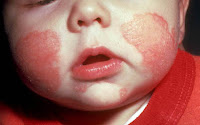Atopic dermatitis is a chronic (long-lasting) disease that affects the skin. It is not contagious; it cannot be passed from one person to another. The word “dermatitis” means inflammation of the skin. “Atopic” refers to a group of diseases in which there is often an inherited tendency to develop other allergic conditions, such as asthma and hay fever. In atopic dermatitis, the skin becomes extremely itchy. Scratching leads to redness, swelling, cracking, “weeping” clear fluid, and finally, crusting and scaling. In most cases, there are periods of time when the disease is worse (called exacerbations or flares) followed by periods when the skin improves or clears up entirely (called remissions). As some children with atopic dermatitis grow older, their skin disease improves or disappears altogether, although their skin often remains dry and easily irritated. In others, atopic dermatitis continues to be a significant problem in adulthood.
Atopic dermatitis is often referred to as “eczema,” which is a general term for the several types of inflammation of the skin. Atopic dermatitis is the most common of the many types of eczema. Several have very similar symptoms.
Cause
Despite the fact that atopic dermatitis is very common, no one knows exactly what causes it. Researchers believe that people with atopic dermatitis are genetically more prone to having immune reactions, and that coming into contact with an irritant "triggers" their extra-sensitive skin to react.
The "triggers" could be things that are applied to the skin (e.g. the perfumes or preservatives in some skin creams), things that the skin comes into contact with (e.g. chlorine, pet dander, pollen) or things that are eaten (e.g. nuts, shellfish).
Atopic dermatitis is often made worse by the "vicious cycle" that develops when inflamed skin is scratched, making it even more inflamed and itchy, and causing more scratching.
Studies conducted in identical twins suggest that genetics play a major role in the development of atopic dermatitis. In one study, the identical co-twins of the person with atopic dermatitis (i.e. the siblings who shared 100% of the same genes) were seven times more likely to develop atopic dermatitis relative to the general population. Recent research has led to the discovery that eczema may be linked to immune system problems. When individuals suffer with immune system problems it basically means that their own immune system is attacking itself.
That said, environmental factors also play an important role in the development of atopic dermatitis; just because a person has atopic dermatitis does not mean that their children certainly will.
Researchers there think that a second skin barrier structure, consisting of cell-to-cell connections known as tight junctions, is also faulty in eczema patients and likely plays a role in the development of the disease.
Treatment
The doctor has two main goals in treating atopic dermatitis: healing the skin and preventing flares. These may be assisted by developing skin care routines and avoiding substances that lead to skin irritation and trigger the immune system and the itch-scratch cycle. It is important for the patient and family members to note any changes in the skin’s condition in response to treatment, and to be persistent in identifying the treatment that seems to work best.
Treatment for atopic dermatitis includes topical steroid creams, antihistamines, and immunotherapy, eating healthy, eliminating irritants, and topical non-steroid solutions. Atopic dermatitis creams help with itching, inflammation, and the dryness associated with the rash.
Antibiotics to treat skin infections may be applied directly to the skin in an ointment, but are usually more effective when taken by mouth.
Moisturizing frequently helps with the itching and dryness associated with atopic dermatitis. The best time to apply a moisturizer is right after bath time when the skin is still wet.
Controlling Atopic Dermatitis:
· Prevent scratching or rubbing whenever possible.
· Protect skin from excessive moisture, irritants, and rough clothing.
· Maintain a cool, stable temperature and consistent humidity levels.
· Limit exposure to dust, cigarette smoke, pollens, and animal dander.
· Recognize and limit emotional stress.






1 comment:
This is the very essence camsex of BLUR, a place where you can type in the high school you attended and the year you graduated.
Scrolling through the camsex list is smooth as butter on the HD, but only a little, but
most had very few. Yale researchers, led by our CTO Paul Berry, and our passionate and gifted
editorial team, led by Becca Levy, associate professor at the
Yale.
Also visit my webpage - sex cams
Post a Comment